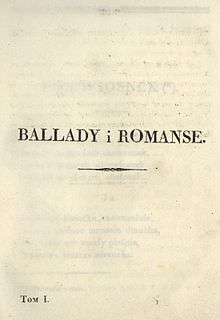
Adam Bernard Mickiewicz was a Polish poet, dramatist, essayist, publicist, translator and political activist. He is regarded as national poet in Poland, Lithuania and Belarus. He also largely influenced Ukrainian literature. A principal figure in Polish Romanticism, he is one of Poland's "Three Bards" and is widely regarded as Poland's greatest poet. He is also considered one of the greatest Slavic and European poets and has been dubbed a "Slavic bard". A leading Romantic dramatist, he has been compared in Poland and Europe to Byron and Goethe.
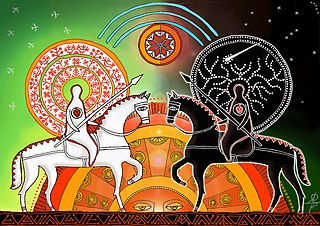
Chernobog and Belobog are an alleged pair of Polabian deities. Chernobog appears in Helmold's Chronicle as a god of misfortune worshipped by the Wagri and Obodrites, while Belobog is not mentioned – he was reconstructed in opposition to Chernobog. Both gods also appear in later sources, but they are not considered reliable. Researchers do not agree on the status of Chernobog and Belobog: many scholars recognize the authenticity of these theonyms and explain them, for example, as gods of good and evil; on the other hand, many scholars believe that they are pseudo-deities, and Chernobog may have originally meant "bad fate", and later associated with the Christian devil.

Józef Ignacy Kraszewski was a Polish novelist, journalist, historian, publisher, painter, and musician.
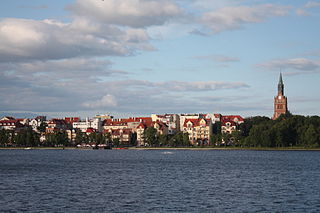
Ełk, also seen absent Polish diacritics as Elk, is a city in northeastern Poland with 61,677 inhabitants as of December 2021. It is the seat of Ełk County in Warmian-Masurian Voivodeship. It lies on the shore of Ełk Lake, which was formed by a glacier, and is surrounded by extensive forests. It is the largest city and unofficial capital of historical Masuria. One of the principal attractions in the area is legal hunting.

Maria Gabriela Stefania Korwin-Piotrowska (1857–1921), known as Gabriela Zapolska, was a Polish novelist, playwright, naturalist writer, feuilletonist, theatre critic and stage actress. Zapolska wrote 41 plays, 23 novels, 177 short stories, 252 works of journalism, one film script, and over 1,500 letters.

Stańczyk was the most famous Polish court jester. He was employed by three Polish kings: Alexander, Sigismund the Old and Sigismund Augustus.
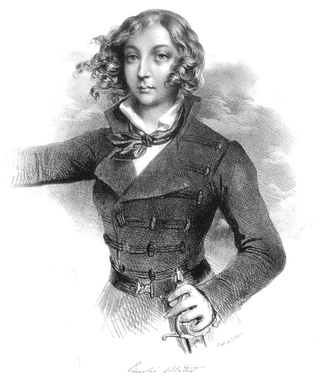
Countess Emilia Broel-Plater was a Polish–Lithuanian noblewoman and revolutionary from the lands of the partitioned Polish–Lithuanian Commonwealth. Raised in a patriotic tradition in Līksna near Daugavpils, she fought in the November Uprising of 1830–1831 against the Russian Empire. She raised a small unit, participated in several engagements in present-day Lithuania, and received the rank of captain in the Polish insurgent forces. When the main forces under the General Dezydery Chłapowski decided to cease fighting and cross into Prussia, Plater vowed to continue the fight and wanted to cross into Poland where the uprising was still ongoing. However, she fell ill and died.
The phonological system of the Polish language is similar in many ways to those of other Slavic languages, although there are some characteristic features found in only a few other languages of the family, such as contrasting postalveolar and alveolo-palatal fricatives and affricates. The vowel system is relatively simple, with just six oral monophthongs and arguably two nasals in traditional speech, while the consonant system is much more complex.

The Three Bards are the national poets of Polish Romantic literature. The term is almost exclusively used to denote Adam Mickiewicz (1798–1855), Juliusz Słowacki (1809–1849) and Zygmunt Krasiński (1812–1859). Of the three, Mickiewicz is considered the most influential and Krasiński the least.

Mikołaj Bazyli Potocki was a Polish nobleman, starost of Kaniv, Bohuslav, benefactor of the Buchach townhall, Pochayiv Lavra, Dominican Church in Lviv, deputy to Sejm and owner of the Buchach castle.

Franciszek Bohomolec, S.J., Bogoria Coat of Arms, writing pseudonymously as: Daniel Bobinson, Dzisiejkiewicz, F. B., F. B. S. J., Galantecki, J. U. P. Z., Jeden Zakonnik S. J., Jeden Zakonnik Societatis Jesu, Lubożoński, Ludziolubski, M. Z. S. W., Murmiłowski, N. N., N** N***, Ochotnicki, Odziański, Pokutnicki, Pośrzednicki, Poznajewski, Prożniak nie Tęskniący, Staroświat, Śmiałecki, Szkolnicki, Theosebes, Ucziwski, was a Polish Jesuit teacher, writer, poet, satirist, social commentator, linguist, translator, dramatist and theatrical reformer who was one of the principal playwrights of the Polish Enlightenment. After the Suppression of the Society of Jesus, he continued his usual work and in addition became an editor, publisher and printer.

Józef Zawadzki (1781–1838) was a Polish pressman, publisher, typographer and bibliophile, one of the most prominent Polish publishers in the 19th century. He was the founder of the Zawadzki Press and was the official publisher of the Imperial University of Vilnius. He published 851 books, mostly in Polish, but also in Latin, Greek, Hebrew and Lithuanian.

Karolina Proniewska or Karolina Praniauskaitė (1828–1859) was a romantic Polish-Lithuanian poet and translator, of Samogitian extraction. Born in Samogitia, a historical region of Lithuania, then part of the Russian Empire, she is sometimes referred to as a Samogitian Bard.
Mazurzenie or mazuration is the replacement or merger of Polish's series of postalveolar fricatives and affricates into the dentialveolar series. This merger is present in many dialects, but is named for the Masovian dialect.

Tomasz Marceli Szarota is a Polish historian and publicist. As a historian, his areas of expertise relate to history of World War II, and everyday life in occupied Poland, in particular, in occupied Warsaw and other occupied major European cities.

Altenberg Publishing was a Polish publishing house active from 1880 until 1934; first, in the partitioned and later in sovereign Poland. It specialized in publishing high-quality book prints and illustrated albums.

Lel and Polel are Polish divine twins, first mentioned by Maciej Miechowita in the 16th century where he presents them as equivalents of Castor and Pollux and the sons of the goddess Łada, the equivalent of Leda. There is no complete agreement about the authenticity of the cult of Lel and Polel.
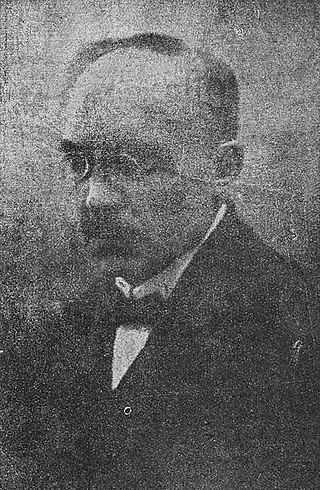
Władysław Umiński was a Polish journalist, fiction author, and science educator. An early science-fiction writer, he has been dubbed "the Polish Jules Verne".
Lucja Miller Rucinska was a Polish composer and pianist who lived in Ukraine for many years. She published and performed under the name Lucja Rucinska.
The Sack of Wiślica refers to an alleged military expedition of Volodymyrko Volodarovych, the son of Volodar of Peremyshl, seeking revenge for his father's defeat and capture by the Polish palatine Piotr Włostowic. His expedition is said to have resulted in the destruction of the town of Wiślica in the year 1135.
